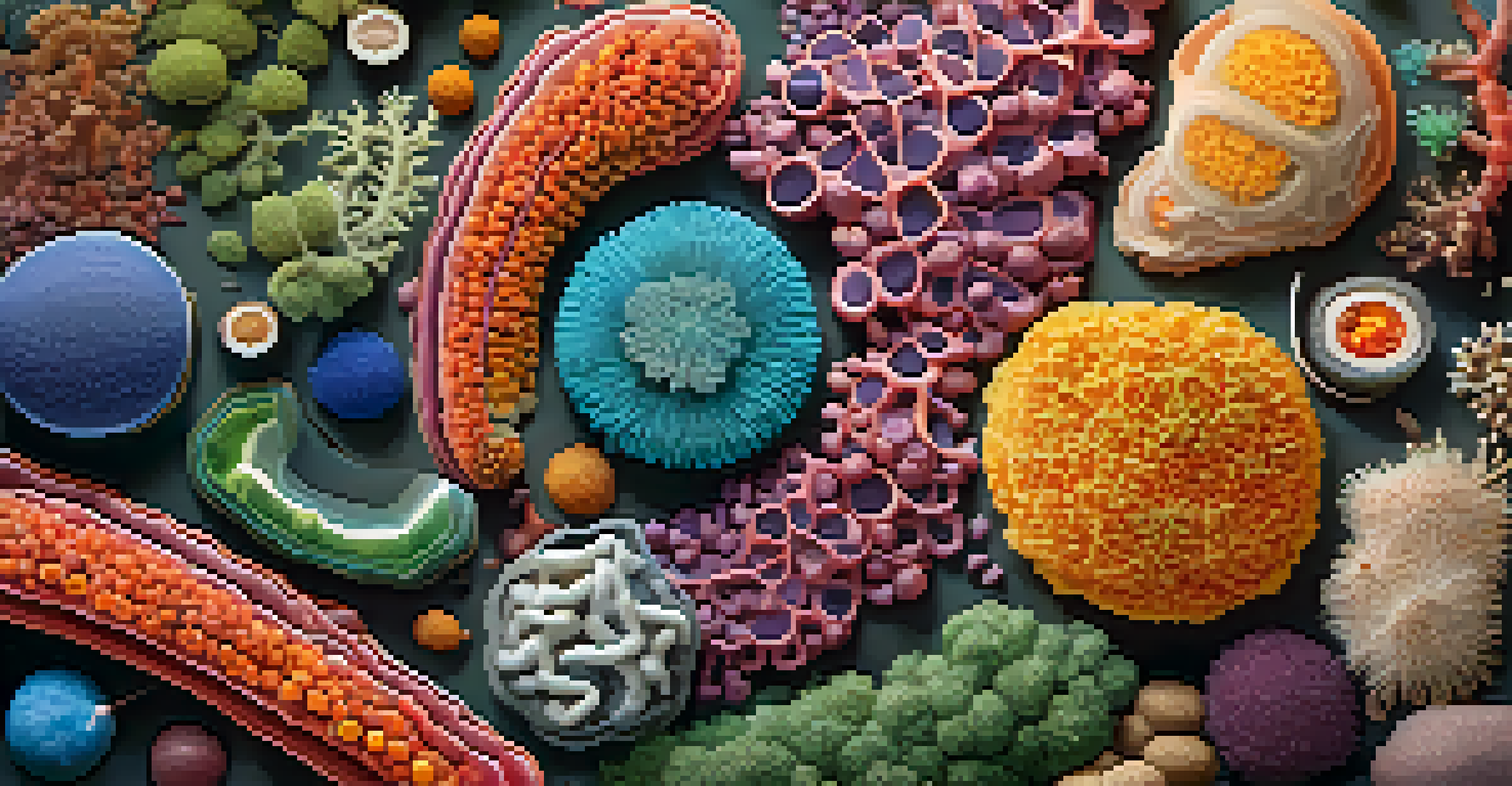Gut Microbiome: A Key Focus in Naturopathic Medicine

What is the Gut Microbiome and Its Importance?
The gut microbiome refers to the vast community of bacteria and microorganisms living in our intestines. These tiny creatures play a crucial role in our overall health, influencing everything from digestion to immune function. Think of the microbiome as an ecosystem, where each organism has a role that contributes to the well-being of the entire system.
The gut is the engine of the body; if it's not functioning well, everything else suffers.
A healthy gut microbiome helps break down food, absorb nutrients, and produce essential vitamins. It also acts as a barrier against harmful pathogens, ensuring that our body remains balanced and functioning optimally. When this balance is disrupted, it can lead to various health issues, such as bloating, allergies, or even autoimmune diseases.
Naturopathic medicine emphasizes the importance of nurturing this delicate ecosystem. By focusing on natural remedies and lifestyle changes, practitioners aim to restore and maintain the health of the gut microbiome, ultimately enhancing the body's ability to heal itself.
The Connection Between Gut Health and Overall Well-Being
Research shows a strong link between gut health and various aspects of overall well-being, including mental health, energy levels, and even skin conditions. The gut microbiome produces neurotransmitters like serotonin, which significantly influence mood and emotional health. Hence, a healthy gut can lead to a happier, more balanced life.

When the gut is compromised, it can lead to inflammation and a range of chronic conditions. This connection highlights why nurturing gut health is essential not just for digestive issues but for holistic health. For example, someone struggling with anxiety might find improvements by addressing their gut health through dietary changes or probiotics.
Gut Microbiome's Vital Role
The gut microbiome is essential for digestion, nutrient absorption, and immune function, acting as a protective barrier against harmful pathogens.
Naturopathic medicine recognizes this connection and often integrates treatments focused on improving gut health to support mental and emotional well-being. By addressing the root causes of health issues through the lens of the gut microbiome, practitioners can offer more comprehensive care.
Common Factors That Disrupt the Gut Microbiome
Several factors can disrupt the balance of the gut microbiome, including poor diet, stress, antibiotics, and lack of sleep. A diet high in processed foods and sugars can lead to an imbalance of harmful bacteria. Likewise, chronic stress can alter gut function and composition, making it harder for the microbiome to thrive.
Your gut is your second brain. It communicates with the brain and has a direct impact on your mental health.
Antibiotics, while necessary at times, can drastically affect the gut microbiome by killing off both harmful and beneficial bacteria. This disruption can create a fertile ground for pathogens to take hold, leading to digestive issues and other health problems. Therefore, it's essential to use antibiotics judiciously and consider post-treatment care for gut restoration.
In naturopathic medicine, a key strategy is to identify and mitigate these disruptive factors. By promoting a balanced lifestyle that includes a nutritious diet, stress management techniques, and proper sleep hygiene, individuals can support their gut microbiome and overall health.
Dietary Strategies to Support Gut Health
Diet plays a pivotal role in maintaining a healthy gut microbiome. Incorporating a variety of whole foods, such as fruits, vegetables, whole grains, and fermented foods, can significantly benefit gut health. These foods are rich in fiber and nutrients, which nourish beneficial bacteria and promote a thriving microbiome.
Fermented foods like yogurt, sauerkraut, and kefir contain probiotics that can help restore balance to the gut. These foods introduce beneficial bacteria directly into the digestive system, aiding in digestion and enhancing the immune response. For example, a daily serving of yogurt can be a simple yet effective way to support gut health.
Diet Shapes Gut Health
Incorporating whole foods, fermented products, and balanced nutrition fosters a thriving gut microbiome, supporting overall health and wellness.
Naturopathic practitioners often recommend personalized dietary plans that focus on whole, unprocessed foods. By tailoring these strategies to individual needs, they help patients foster a gut environment that promotes overall health and wellness.
The Role of Probiotics and Prebiotics
Probiotics and prebiotics are essential components of gut health that often come up in naturopathic medicine. Probiotics are live beneficial bacteria that can be consumed through supplements or fermented foods, while prebiotics are non-digestible fibers that feed these good bacteria. Together, they work synergistically to enhance gut health.
Taking probiotics can help restore the microbiome after a disruption, such as after antibiotic use. They can also improve gut barrier function and reduce inflammation, leading to a healthier digestive system. On the other hand, prebiotics, found in foods like garlic, onions, and bananas, provide the fuel needed for these beneficial bacteria to thrive.
Integrating both probiotics and prebiotics into one's diet is a common recommendation in naturopathic approaches. This combination not only supports gut health but can also lead to improved digestion, enhanced immunity, and better overall health.
Lifestyle Changes to Enhance Gut Health
Beyond diet, several lifestyle changes can significantly improve gut health. Regular physical activity, for instance, has been shown to promote a diverse and healthy gut microbiome. Engaging in activities you enjoy, whether it's walking, yoga, or dancing, can encourage better digestion and overall well-being.
Stress management is another critical aspect of gut health. Practices like mindfulness, meditation, and deep breathing exercises can reduce stress levels, which in turn supports a balanced microbiome. For example, taking a few minutes each day to practice deep breathing can help calm the mind and provide relief to the gut.
Lifestyle Impacts Gut Balance
Regular exercise and stress management are crucial lifestyle changes that enhance gut health and promote a diverse microbiome.
Naturopathic medicine often emphasizes a holistic approach by incorporating these lifestyle changes into patient care. By addressing physical activity and stress management alongside dietary strategies, individuals can create a comprehensive plan for enhancing their gut health.
The Future of Gut Microbiome Research in Naturopathy
As research on the gut microbiome continues to evolve, its implications for naturopathic medicine grow more significant. Ongoing studies are exploring how specific strains of probiotics can target various health conditions, from digestive disorders to mental health issues. This developing knowledge offers exciting opportunities for personalized naturopathic treatments.
Additionally, advancements in technology allow for more precise analysis of an individual's microbiome composition. By understanding the unique makeup of a patient's gut bacteria, naturopathic practitioners can tailor interventions to support optimal health. This personalized approach is a hallmark of naturopathic care, ensuring that treatments cater to individual needs.

In conclusion, the future of gut microbiome research holds great promise for enhancing naturopathic medicine. As we deepen our understanding of this intricate ecosystem, we can better support individuals on their journey to health and wellness.